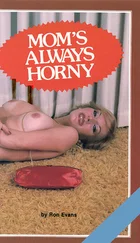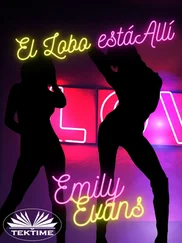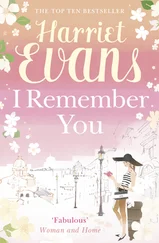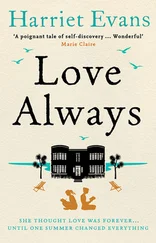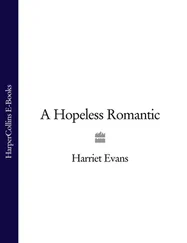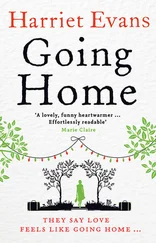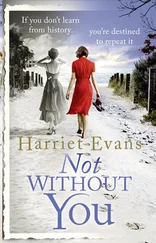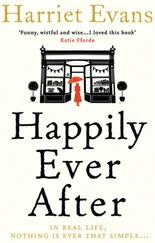Harriet Evans - Love Always
Здесь есть возможность читать онлайн «Harriet Evans - Love Always» — ознакомительный отрывок электронной книги совершенно бесплатно, а после прочтения отрывка купить полную версию. В некоторых случаях можно слушать аудио, скачать через торрент в формате fb2 и присутствует краткое содержание. Жанр: Старинная литература, на английском языке. Описание произведения, (предисловие) а так же отзывы посетителей доступны на портале библиотеки ЛибКат.
- Название:Love Always
- Автор:
- Жанр:
- Год:неизвестен
- ISBN:нет данных
- Рейтинг книги:3 / 5. Голосов: 1
-
Избранное:Добавить в избранное
- Отзывы:
-
Ваша оценка:
- 60
- 1
- 2
- 3
- 4
- 5
Love Always: краткое содержание, описание и аннотация
Предлагаем к чтению аннотацию, описание, краткое содержание или предисловие (зависит от того, что написал сам автор книги «Love Always»). Если вы не нашли необходимую информацию о книге — напишите в комментариях, мы постараемся отыскать её.
Love Always — читать онлайн ознакомительный отрывок
Ниже представлен текст книги, разбитый по страницам. Система сохранения места последней прочитанной страницы, позволяет с удобством читать онлайн бесплатно книгу «Love Always», без необходимости каждый раз заново искать на чём Вы остановились. Поставьте закладку, и сможете в любой момент перейти на страницу, на которой закончили чтение.
Интервал:
Закладка:
I look out of the window, blinking back tears, and nod: there is the perfect little vil age with a beautiful house and golden-yel ow church, plonked seemingly in the middle of nowhere, that I kept my eyes glued to the window looking for every year when I was little. The fields are flooded; there are confused ducks swimming in the water, not sure what to make of it. Up on the banks by the tracks, cobwebby Old Man’s Beard covers everything, the beautiful tracery concealing the hard branches beneath. Thankful for the distraction, I stare, wondering where my sketchbook is, anything to take my mind off it al .
Granny loved jewel ery. I’m sure that my interest in it stems from the hours I spent with her looking at her pieces, holding them up and thril ing to the sensation of metal and stone on my skin, against my face. The two big jewel ery boxes on that dressing table were neatly stacked with al kinds of wondrous things: a chunky jade pendant, worn on a thick silver chain, tiny diamond dangly earrings that she bought for herself when she had her first show (it occurs to me now that these were valuable; she kept them quite blithely with the costume jewel ery), delicate strings of creamy coral, a gold Egyptian-style col ar necklace that she got from the Royal Opera House, a prop from Aida which she used on a model for a painting, a large amethyst ring that was her mother’s, and final y the two that were never in the box, because she was always wearing them. The thick gold-linked bracelet studded with turquoises which Arvind gave her for her thirtieth birthday, and the pale gold ring she always wore on her right hand, of three sets of two intertwined diamond flowers, like tiny peonies. It is a family ring: Arvind’s father sent it from Lahore when they were married. That was my favourite piece of them al , a link with Arvind’s family, the country he left long ago. Because I vaguely remember Granny’s father, but I never met Arvind’s father, nor any of his family. Two of his brothers died during Partition, and his father stayed in Lahore. He never saw his son again.
So Granny’s jewel ery box was like an Aladdin’s cave for me, and now, when I sit in my studio, sketching out designs, working out different ways to coat something with gold leaf, searching for an enamel er who won’t demand payment right away, often I am reminded where I first got my inspiration from: Granny’s jewel ery box, the almost terrifying pleasure of being al owed to look inside it.
Now, gazing at the bare branches black in the grey light, I let my mind drift. I think how lovely a silver necklace linked with tiny branches would look, and I wonder how easy – or extremely difficult – it would be to replicate the delicate, sugar-spun tracery covering them. I should make a sketch, in the ideas book I used to carry with me, always. I haven’t drawn in it for ages. Haven’t come up with anything for ages.
Five years ago, when I had a stal of my own and was making just enough money to afford the flat share in West Norwood and the occasional item from Topshop, life was simple. Now, we live in a trendy apartment off Brick Lane and I have a flashy website and a husband who earns enough money tel ing clients that their toothpaste’s branding is too male-oriented to keep us both.
So real y, it shouldn’t matter that tomorrow I might lose my business, should it? Lose everything I’ve worked for and dreamed about, ever since the long-ago days when I’d climb onto Granny’s stool and open her jewel ery box, my mouth gaping in wonder. Strange, that the two things are so close together. Her funeral, my summons.
I shake my head, and the cold, clammy fear that, lately, always seems to be with me grips me again. No. I’m not thinking about that today. Not today, Granny’s funeral, not today. They’l tel me tomorrow. I just have to get through today.
My phone buzzes and I look down.
Missed you again last night. When are we going to talk? Ox
Now I am going to be sick. No sleep, no breakfast, on top of everything else, and this time I know it. I stumble towards the lavatories, pushing open the rank, sticky doors, and I vomit, retching loudly, bile flooding out of me; it feels almost cleansing. People must be able to hear.
I’m trying not to cry at the same time, pushing my hair out of my mouth. I stand up and look in the mirror, tears running down my cheeks, because I feel so awful, so sad, every protective layer I cover myself with ripped off and suddenly the almost cartoon terribleness of it makes me start to laugh. Suddenly I remember Cathy saying to me, ‘Has anyone ever explained to Oli that when he signs off with his initial and a kiss he’s writing the word “Ox”?’
I smile, I look dreadful, lank brown hair hanging about my sal ow face, dark brown shadows under my startlingly green eyes. People at school cal ed me alien because of my eyes; I hated it. I hadn’t thought of that for ages either and it makes me smile again. I wipe my mouth on a tissue. I wil go to the canteen and get a coffee, a banana. I feel better, purged.
Slowly, I open the door, embarrassed in case someone is outside and has overheard, and I hear two voices, approaching briskly.
‘My best guess is we’l be five mins late, no more,’ the first, a male voice, is saying.
‘I’l cal Mummy. God knows she’s got enough to do without us holding her up today.’
I freeze. No way.
‘Bloody good thing Guy’s already there,’ the male voice says, languidly, but with a hint of menace I remember of old. ‘We need someone to sort through that house, make sure the valuable stuff gets treated properly. I mean, those paintings must be worth a bob or two . . .’
Julius and Octavia. I shrink back against the door as they march past, catching only a glimpse of Octavia’s sensible brown flat boots and grey wool skirt and her hand, clutching a twenty-pound note, as they stride purposeful y past on their way to the buffet car, a Leighton phalanx of aggressive righteousness. I don’t know why it surprises me – this is the only train from London that gets to Penzance in time for the funeral, but of al people Julius and Octavia are not who I would have chosen to bump into, post-vomit, outside the First Great Western lav.
They are Louisa’s children, and so they are my second cousins, and though I spent almost every summer of my life with them, there is no emotional connection to show for it. If you knew Octavia and Julius, though, you might understand why. They have even been given Roman names, I think to reflect their parents’ passion for discipline and order. I hear Julius’s posh voice again. ‘Bloody good thing Guy’s already there.’
My skin prickles with silent rage. Guy is their uncle on their father’s side. He is an antiques dealer. I never knew he was close to Granny, or our family. I grit my teeth at the thought of Guy going through Granny’s paintings, her jewel-lery box, with Louisa standing behind with a clipboard, ticking stuff off on a list. They are very definite people, the Leightons. I love Louisa, she’s kind and thoughtful, and she does mean wel , I think, but she can be dreadful y bossy. The four of them, her, the Bowler Hat, Julius and Octavia, are al terribly – not hearty exactly, more – confident . The confidence that comes from living in Tunbridge Wel s, being a civil servant, going to a public school, being a unit of four, a proper family. Al things I am not.
I wait until their voices have faded into the distance and cautiously, I creep back to my seat, a little shaky stil , and stare out of the window again. Two fat crows are picking away at the mossy roof of a disused barn. Above them, the skies are opening wider and wider, and birds wheel through the air. We’re getting there, we are nearly in Exeter. My phone buzzes again.
Читать дальшеИнтервал:
Закладка:
Похожие книги на «Love Always»
Представляем Вашему вниманию похожие книги на «Love Always» списком для выбора. Мы отобрали схожую по названию и смыслу литературу в надежде предоставить читателям больше вариантов отыскать новые, интересные, ещё непрочитанные произведения.
Обсуждение, отзывы о книге «Love Always» и просто собственные мнения читателей. Оставьте ваши комментарии, напишите, что Вы думаете о произведении, его смысле или главных героях. Укажите что конкретно понравилось, а что нет, и почему Вы так считаете.


